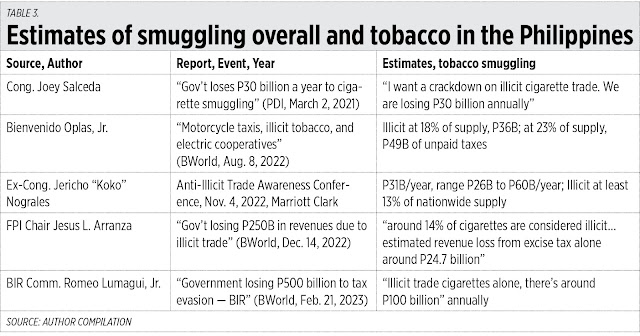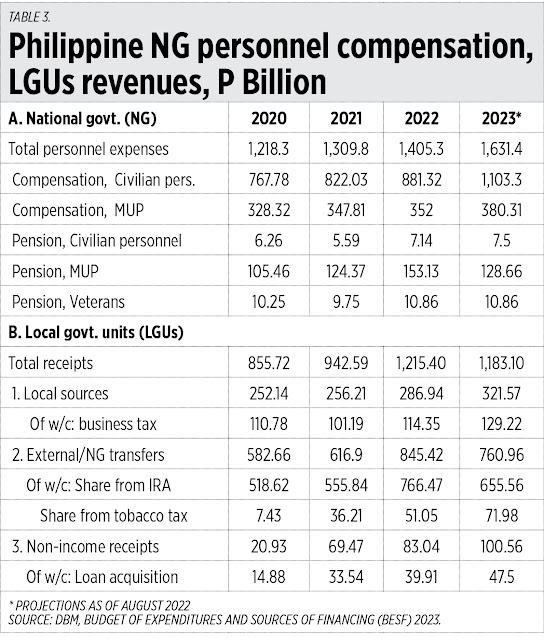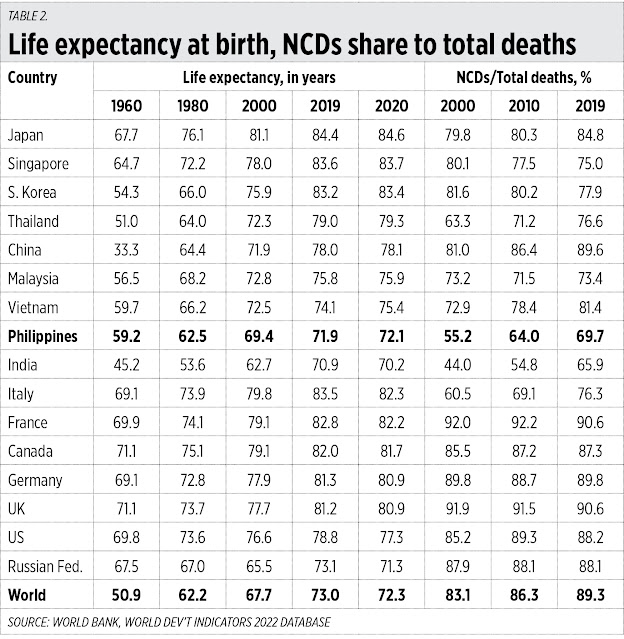* BusinessWorld March 20, 2023.
-----------------
Among the important parts of the two days program are the overview of policies and programs of the DoE and ERC, Keynote speeches are by the Senate President Pro Tempore, and the Chairpersons of the Senate and House Committee on Energy.
Then the discussions will tackle the challenges and opportunities in the generation sector, the distribution and retail electricity supply, the transmission development program, the privatization program by the Power Sector Assets and Liabilities Management Corp. (PSALM), and the relaunching of nuclear energy program in the Philippines.
Electricity security and reliability is very important when it comes to attaining fast and sustained growth. To help illustrate this point, I construct this table (See Table 1). The numbers show many important points.
One, compared to our neighbors in the ASEAN-6 (Indonesia, Vietnam, Malaysia, Thailand, Philippines and Singapore), the Philippines had the lowest electricity generation in the region until 2021, with only 108 terawatt-hours (TWH). This level was attained by Vietnam in 2012, by Malaysia in 2007, by Indonesia and Thailand in 2002, by Taiwan in 1992, and by South Korea in 1989 or more than three decades ago.
Two, in kilowatt-hour (KWH) per capita generation, ours is also among the lowest in the region.
These two indicators suggest that the Philippines does not have sufficient electricity security and reliability. When the power supply is low, it means yellow-red alerts are not far behind, and potential blackouts will continue to harass businesses and households.
Three, fast growth in power generation leads to fast GDP growth. A good fit and experience in this trend are China, India, South Korea, Taiwan, and the ASEAN-6.
Four, slow growth in power generation leads to slow GDP growth. Good examples are the G7 countries — the US, Canada, Germany, France, the UK, Italy, and Japan — especially from 2006 to 2021 (See Table 1).
That the Philippines has thin power reserve margins coupled with supply withholding by big gencos is not good. Last week I attended Kamuning Bakery Café’s Pandesal Forum, hosted by Wilson Lee Flores, where ERC Chairperson Monalisa Dimalanta spoke on “Philippine energy security and affordability.”
One question that was asked of Ms. Dimalanta was how the ERC would go about enforcing contracts, particularly the power supply agreement (PSA) between Meralco and units of SMC Global Power Holdings Corp. Ms. Dimalanta said that the ERC has to implement and assert the PSA as it relates to prices and continuous power supply to consumers, including requiring the utility to enforce the contract. I like this lady — she really practices the rule of law. The law and contract apply equally to unequal people and circumstances. The fixed-price contract was voluntarily signed and not coerced.
Related stories recently reported in BusinessWorld are: “Mindanao-Visayas grid connection seen completed by June” (March 13), “ERC to review Meralco-GNPD power deal” (March 13), and, “ERC sees new missionary charge taking effect in May at earliest” (March 16).
On relaunching nuclear power in the Philippines — tackled in Day 1 of the IEMOP conference — there were two related reports in BusinessWorld: “Meralco chairman says plan to go nuclear may take 10 years for PHL” (March 6), and, “Health impact added to nuclear plant objections” (March 12).
Nuclear power has been used to generate power since the 1960s, with some 2,800 TWH generated in 2021. Big users with generation of at least 150 TWH are the US, China, France, Russia, and South Korea. Thousands of hospitals and healthcare facilities worldwide have benefited from having ample electricity contributed to by nuclear power, more than offsetting the hypothetical health dangers of this technology.
The Philippines’ Bataan Nuclear Power Plant (BNPP) has 620 MW in installed capacity. If the average capacity factor is 85%, then its dependable capacity is 527 MW. So, in one day, or 24 hours, it can generate 12,648 megawatt-hours (MWH) of electricity; in one year, or 365 days, it can generate 4.62 million MWH or 4.62 TWH.
If the BNPP was allowed to operate in 1985 or 1986, then it could have contributed or added 20% of total generation in 1985, and 4.2% in 2021 (See Table 2).
There are important lessons from all this in planning for electricity security, stability, and reliability are the following.
One, we should measure power addition and security in MWH or TWH, not MW. Coal, gas, and oil plants, plus nuclear have higher energy density and capacity factor than intermittent and unstable sources like wind and solar.
Two, electricity price control should go. The most expensive electricity is no electricity — blackouts. Using candles or gensets are dangerous and more costly. When power supply and reserves are high, prices generally decline due to competition.
Three, since the Philippines targets to have sustained GDP growth of 6-8% a year, power generation must also increase 6-8% a year. That means from 108 TWH in 2021, we should have 116 TWH in 2022, 124 TWH in 2023, 133 TWH in 2024, 142 TWH in 2025, 152 TWH in 2026, 163 TWH in 2017, and 174 TWH in 2028. There should be an annual increase of 9-11 TWH a year.
---------------
See also:
BWorld 586, Crisis narratives as hindrance to growth and freedom, March 03, 2023
BWorld 587, Inflation, government spending and borrowings, March 24, 2023
BWorld 588, Addressing high inflation and tax leakage, March 25, 2023.





























